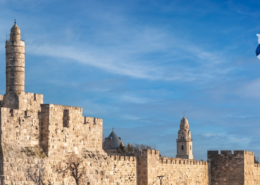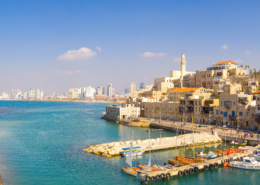Last week, we reflected upon HRH Prince Philip’s faith but his passing shed light upon his late mother, Princess Alice of Battenberg, who committed to Greek Orthodoxy, spending years doing charitable work, nursing war veterans, distributing her own possessions and food to poor people. During the German occupation of Greece, Alice sheltered a Jewish woman and her children in her home, saving them from being deported to Nazi camps in Germany.
Princess Alice, great granddaughter of Queen Victoria, was born in Buckingham Palace and is now buried in that most glorious of burial grounds, upon the Mount of Olives. For her bravery and self- sacrifice in sheltering Jewish people in her home, when they had appealed to her for sanctuary, Alice was officially esteemed by Israel as “Righteous Among the Nations”. A memorial for her has been placed in Yad Vashem, and Alice holds an extraordinary testimony and life story.
Alice was deaf and she learned to lipread English, German and French. At the age of 18 years old, the beautiful Princess married Prince Andrew of Greece and Denmark, with whom she had fallen deeply in love the year before, following their meeting at the coronation of King Edward VII in 1902. The wedding was a splendid affair even by Royal standards and the gifts the royal couple received, are said to be worth over £16 million, in todays’ evaluation.
Despite the fairytale wedding, within two years of being married and moving to Greece, Alice’s husband’s family was impacted by severe political upheaval of a national scale, and her love story appeared to turn to a nightmare. Alice’s brother-in-law, High commissioner of Crete, had to resign from his position, and her own husband followed suit in resigning from the military, by 1909. By this time, Alice had given birth to her first child, and also travelled to Russia to attend a cousin’s wedding. During her time in Russia, Alice spent time with her aunt Elizabeth Feodorovna who founded a religious order of nurses, built a church which was inaugurated during Alice’s visit and they shared conversations of faith. Returning to Greece just in time to give birth to her second child, Alice began to involve herself in charity work and she also began to sell her possessions to feed the poor and help various causes.
Three years later, Alice herself served as a nurse during the Balkan wars. The experience was traumatic abut she wished to persevere and help. The combined experiences of political turmoil, threats to Prince Andrew’s life, giving birth to several children and PTSD from the trauma of death and injury during the Balkan war, as well the execution of her aunts and cousins in Russia, including her beloved Elizabeth Feodorovna, pushed Alice into mysticism. Having looked initially to the occult for answers to the turmoil and fear of these turbulent years, she then began to look to Greek Orthodox Christianity during her experiences on the frontline of the war as a nurse, and particularly, after her exile as a refugee from Greece, fleeing the threat of execution with her baby son carried in an orange crate.
Having been received by Prince Andrew’s sister in France, Alice’s family lived as exiles on the outskirts of Paris. During this time, Alice believed that she was receiving visions and visitations from Jesus Christ and her eccentricity caused Andrew to consult his sister, who was an exceptionally close friend of Sigmund Freud. Alice was diagnosed as a paranoid schizophrenic but her treatment deemed unsuccessful, and her husband had her sent to forcibly to sanatoriums for two years and a half years, on the continent. Freud’s recommendations to the specialist in charge, were to repeatedly expose Alice to pseudoscientific treatments, which were cruel and painful. Alice protested but was kept there, whilst her husband moved to the south of France with his mistress.
Having left the sanitoriums, and finding that her husband and close family had closed their doors to her, Alice returned to Athens and worked for the Red Cross. Alice helped to organise soup kitchens for the starving populace and it is documented that she flew to Sweden to bring back medical supplies on the pretext of visiting her sister Louise, who was married to the Crown Prince of the nation. Alice also set up two shelters for orphaned and lost children, and a nursing circuit for poor neighbourhoods. Following the liberation of Greece, there was much hunger and suffering for many and Alice used to walk the streets, breaking the curfew, distributing the little food parcels she had from her brother, Lord Mountbatten, to policeman and children who were in need.
Alice eventually went on to tour America twice, in order to raise funds for an order of nuns, which she set up in the style of her cherished Aunt, Elizabeth Feodorovna, and selling her own jewels, did herself become a nun, taking up he garb for the rest of her life. Alice also began a tour of India as the guest of Rajkumari Amrit Kaur, a Princess of Punjabi descent who was a Protestant Christian and was intrigued by Alice’s interest in Indian spirituality. The tour was cut short due to ill health and the frailty that ensued, led to Princess Alice coming to live in the place of her birth, Buckingham Palace, where she died two years later, in 1969.
Posthumously, her wish to buried in Jerusalem like her Aunt Elizabeth Feodorovna, was fulfilled. What she had apparently never disclosed to anyone during her life, was that she had saved the lives of three Jewish people. It was only following her death, that a descendent of the Cohens whom she saved, told of her courage and kindness. Evy Cohen also revealed that the Gestapo had become suspicious of Alice, ensuing in a terrifying visit to her home. Quick witted Alice used her hearing issue to indicate that she was unsure of the questioning of the officers, and they gave up and left! This revelation led to Alice receiving the honour of being listed amongst the Righteous Among the Nations, and Prince Philip attended the ceremony in Jerusalem, condemning the atrocities of the Holocaust and writing in the visitor book, that “God brings everything we do to judgement” (Paraphrase of Ecclesiastes 12:14).





